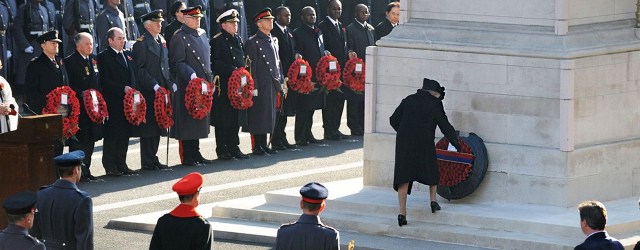 Photo: Royal British Legion.
Photo: Royal British Legion.
Sir Peter Marshall is Past President of the Royal Commonwealth Society, a former Deputy Commonwealth Secretary-General (1983-88), a former British diplomat, has served as a Permanent Representative to the United Nations and trained in Canada during World War Two in the British Commonwealth Air Training Plan (BCATP).
To a WW II veteran like myself, the most poignant Commonwealth image of the year is on Remembrance Sunday, when all the Commonwealth High Commissioners, rank upon rank of them, join the Royal Family, British politicians of all parties, the Service chiefs, hosts of veterans and supporters, in laying wreaths at the Cenotaph in Whitehall.
This is no mere routine gesture of inter-governmental solidarity on the part of the High Commissioners, but a central feature of a Commonwealth-wide living tribute to those millions, from all over the Commonwealth who, especially during the two World Wars, enlisted of their own accord and fought in the common cause far from home, all too often making the ultimate sacrifice.
The difference of aftermath between the Great War and World War II
The occasion will be especially poignant this year, the centenary of the Armistice: indeed it brought a cessation of the terrible slaughter and sacrifice endured by the participants in the Great War, but tragically – as it transpired – did little to remedy the fundamentals that had caused it, and so bring that lasting peace which was so fervently enshrined in the slogan “the war to end all wars”.
In the event, disillusionment and despair embittered further the dread legacy among the survivors of disablement and traumatisation, as well near-universal bereavement. Had it all been in vain?
The survivors of the Second World War have been spared much of this agony. To use the wording of the Kohima War Cemetery epitaph, we can say that we have by and large managed Our Tomorrow in a manner worthy of the sacrifice of those who gave Their Today.
The Three “R”s
What the ghastly experience of the first half of the twentieth century teaches us is that remembrance, essential though it is, does not suffice on its own. We need three “R”s: Reconciliation and Rededication, as well as Remembrance.
Reconciliation can be hard to come by: forgiveness is an acquired taste, rather than a natural instinct. The greater the injury of which you feel yourself to have been the victim, the more difficult it is to forgive those whom you hold responsible for having inflicted it. The quest for revenge, however, even if it can with full justification be described as “redress”, or “justice”, rarely leads to entire satisfaction; it can soon begin to pall.
Achieving reconciliation is a mutual business. It implies that you come to recognise that there are usually at least two sides to most big questions; and that you can respect another point of view, even though you may not be able to accept it. That, in turn, helps to understand what went wrong, what has to be avoided in future, and what has to be thought about and cherished, so as to stop things going wrong. Prevention is better than cure. That constitutes Rededication.
Collective responsibility for the management of change
We live in a fast changing world, full of exciting possibilities. Hyper-connectivity has also developed it into a global village, where almost anything can affect almost everything else. Rededication is thus a dynamic task: to secure the efficient and humane management of our interdependence in rapidly changing conditions.
We all have a responsibility to our fellow creatures and to the planet. Responsibility is the other side of the coin of service.
The unique role of the Commonwealth
Among the founding members of the League of Nations were six Commonwealth members: the UK, Canada, Australia, New Zealand, South Africa and India. With South African Prime Minister Jan Christiaan Smuts in the lead, they tried to make it work. But without US participation it was doomed politically.
It was very different after 1945: there was full US involvement in the United Nations. The jewel in the UN crown is the Preamble to the UN Charter: it was not part of the original proposals for a Charter. It was devised, with Smuts again in the lead, by a meeting of Commonwealth Ministers in London on the eve of the San Francisco Conference at which the Charter was adopted.
A worthy companion to that iconic text came four years later in the shape of the 1949 London Declaration by Commonwealth Prime Ministers, containing the formula by which India remained in the Commonwealth on becoming a republic.
That achievement alone would have marked out Jawaharlal Nehru, India’s first Prime Minister, as a world statesman. There was much more to come. The Commonwealth has taught us a great deal since then and there’s assuredly more to come.
Related articles:



